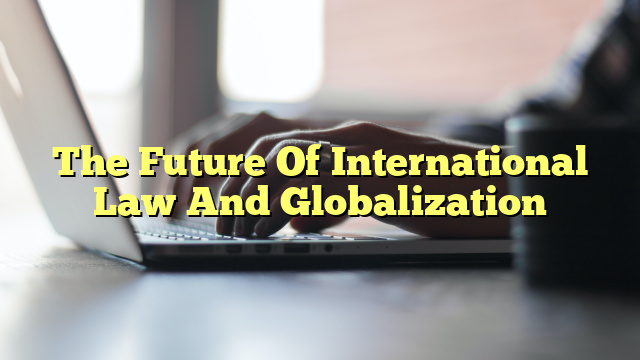Table of Contents
- Introduction
- Impact of Globalization on International Law
- The Connection Between Globalization and the Rule of Law
- The Role of International Law in Global Politics Today
- The Role of Law in Globalization
- Conclusion
Introduction
In today’s globalized world, international law plays an increasingly important role in shaping the way states and international organizations interact. It provides a framework for organizations and states to negotiate and resolve disputes without resorting to violence and war. As globalization continues to bring countries closer together, international law will become even more important in the future. This article will explore the future of international law and globalization and discuss how they are related.
Impact of Globalization on International Law
Globalization has had a significant impact on international law. With the growth of international trade and investment, the need for a uniform system of rules governing these activities has become increasingly important. This has resulted in an increased demand for international legal services, such as dispute resolution, arbitration, and contract negotiation. In addition, globalization has led to an increase in migration, which has created a need for international law governing the rights of migrants and refugees.
The growth of international organizations, such as the United Nations, has also increased the need for international law. These organizations have relied on international treaties and conventions to govern their activities and to ensure the collective security of nations. Globalization has also resulted in a growth in international environmental law, as nations increasingly recognize the need to protect the environment from pollution and degradation.
The Connection Between Globalization and the Rule of Law
The connection between globalization and the rule of law is clear. Globalization has created a need for a uniform system of laws that applies to all nations, regardless of their size or resources. This has led to an increased emphasis on the importance of international law in the global economy, as well as the need for states to respect international legal norms and obligations.
At the same time, globalization has created a need for states to cooperate in order to resolve disputes and ensure the collective security of nations. This cooperation often relies on the existence of international legal instruments, such as treaties and conventions, to set out the rules and obligations of states in resolving disputes. As such, the rule of law is an important element of globalization, as it provides a framework for states to interact with each other in a peaceful and legally binding manner.
The Role of International Law in Global Politics Today
International law is an essential tool for creating a just and peaceful global order. It provides a means for resolving disputes between states and for protecting the rights of individuals, both nationally and internationally. In the current global context, international law is essential for creating a just and equitable global economy, as well as for promoting global peace and security.
International laws also play an important role in protecting the rights of individuals. International human rights laws, for example, provide a framework for protecting the rights of individuals, regardless of their race, gender, or nationality. These laws also help to ensure that states are held accountable for their actions, as they are bound by international legal norms and obligations.
The Role of Law in Globalization
The role of law in globalization is clear: it provides an essential framework for international cooperation and provides a means for resolving disputes. In the globalized world, it is important that states are bound by international legal instruments and that they adhere to their legal obligations. International law provides a basis for promoting cooperation between states and for protecting the rights of individuals.
At the same time, it is important to note that international law is not a panacea. As globalization continues to bring countries closer together, it is essential that countries respect each other’s sovereignty and have adequate legal systems in place to protect the rights of individuals. Therefore, it is vital that countries continue to adhere to their international legal obligations and that they take steps to ensure that their own legal systems are effective in protecting the rights of their citizens.


Globalization is creating a world of possibilities in international law, a future we can look forward to.
It’s alarming how the boundaries of international law and globalization are merging. However, I believe it’s unsustainable in the long-term, as increased corporate power and an uneven playing field can stifle much-needed social progress. For instance, the current focus on cutting regulations in the name of globalization is a prime example of this risk.
The interconnectedness globalization has ushered in has opened new doors for international law- a positive step forward.